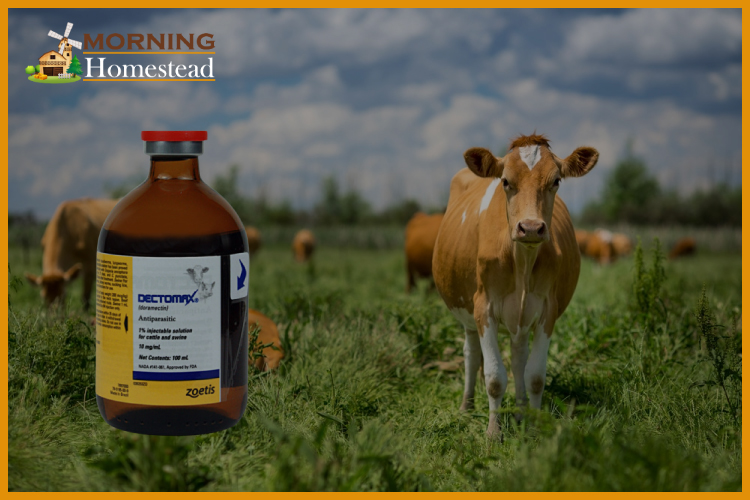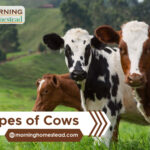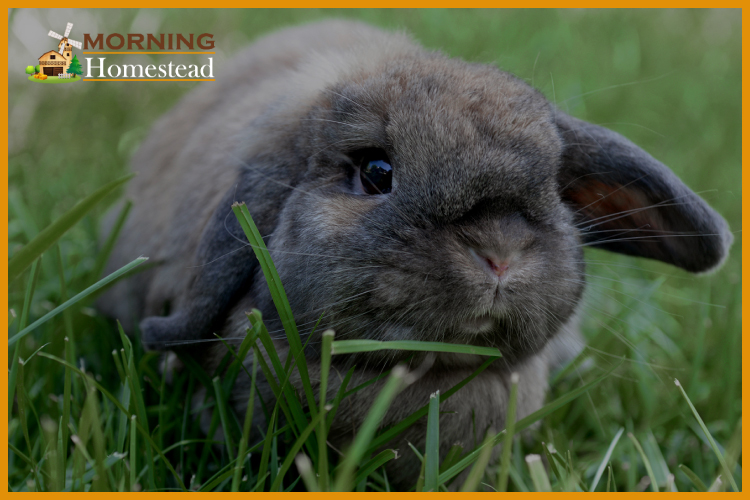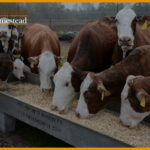Last Updated on June 14, 2023 by Georgie Smith
The need to worry about and treat internal parasites in cattle will exist as long as cows graze in pastures. The good news is, the level of parasites varies and are not the same for all cattle and all fields. The heavily-stocked fields typically have higher parasite issues than the ones with a limited amount of livestock.
Cows kept in dry lots are even less likely to become infested with parasites as the ones living in open pastures. Younger calves generally have elevated amounts of internal parasites than older cows in the livestock.
Therefore, the strategies to control internal parasites should be to fit the unique situation with production. Strategic avenues for deworming begins with understanding the life cycle of the parasite. Identifying and treating a seasonal change in various parasites not only burdens but it implements control that is cost effective.
See Also:
- The 5 Best Fence For Cows Including Barbed Wire To Keep Your Cattle Safe
- Best Feed For Beef Cattle For Adequate Dietary Needs Guide and Review
- The 5 Best Minerals For Cattle That Keep Them Happy And Healthy
A deworming program that is successful, along with competent management of your herd increases milk production. Thereby, the weight of the calves that are weaning typically increases.
The purpose of this educational article is to shine a light on various internal parasites that can harm your cattle. Also, we do the hard work for you by finding the best cattle wormer medicine available on the market today.
It is our job to provide consumers with cost-effective yet satisfactory products without having to pay high prices with a livestock vet.
Managing Destructive Parasites in Cattle
Parasites that wreak havoc internally are part and parcel of the cattle’s ecosystem, better known as the “ecology of the body.” Wild birds and other wild animals cross through your cattle pastures leaving parasites behind. These parasites then look for the nearest feeding, and that is where it all begins.
These parasite substances dehydrate due to the sun, or they lack nourishment before the animals find their way back to the fields. However, the cattle subjected to lounging areas or pastures typically do not get proper rest. These cows often have a build-up of multiple loads of parasites.
That generally happens in humid regions where the temperature and moisture are helpers to reproductive and growth cycles.
*Helpful Tip*
Cattle that have weak immune systems and are young tend to be the most vulnerable. That includes lactating and pregnant cattle. Monitor your cattle closely to ensure they do not become underweight with parasite issues.
The Five Best Cattle Wormers Available Without a Prescription
Safe-Guard 0.5% Pellets 1 lb Bag
This product is for use with dairy and beef cattle and other livestock including:
- Wildlife Animals
- Zoo Animals
- Growing Turkeys
- Swine
While this safeguard product is in a one-pound bag and works miracles with ridding your cows of parasites, it also has no milk withdrawal effect. When you add Safeguard, you are assisting your cows by improving their overall health and weight.
The medicine goes directly to the gut of the animal to kill all internal parasites. These parasites live in a broad spectrum which is why it can be difficult to put an end to the adult and newborn worms. Safeguard pellet dewormer from Intervet has around 2.27 gms of the additive “fenbendazole” per pound of both dairy and beef cattle.
For complete control and removal of the following parasites, choosing this product is safe and effective:
- Nodula Worms
- Bankrupt Worms
- Intestinal Worms
- Lungworms
- Hook Worm
- Small Intestinal and Stomach Worms
- Hook Worms
- BarberPole Worms
- Brown Stomach Worms
This product is one of the best-sellers on Amazon. You can join the other thousands of farmers, zoo’s, and livestock vets today to get your cattle parasite free. To secure ordering and to have it shipped directly to your front door, you can do so from here. Also, be sure to read additional information from the link below on why it is so popular.
*Helpful Tip*: Did you know parasites that feed internally can cost farmers more than $190.00-$200.00 per cattle head throughout its lifetime in lost performance?
Buy from Amazon
Ivermectin Pour-On Pest Control For Cattle
Some cattle prefer the pour-on type control and treatment of gastrointestinal parasites such as these:
- Flies
- Biting Lice
- Grubs
- Roundworms
- Sucking Lice
- Sarcoptic Mange Mites
Ivermectin Pour-On treatment is not alone in this category, it is, however, one that tackles parasites that attach to the skin and work their way into the castles system. This particular treatment is a 2.5 ml container.
To get this effective treatment and rid your cattle of harmful infestations, it is available here with a manufacturer’s full warranty of money-back guarantee.
Buy from Amazon
DavesPestDefense Merck Animal SafeGuard En-Pro Al Molasses Medicated Dewormer
This 25-pound block of medicated dewormer for cattle from DavesPestDefence is the ideal treatment to keep around your homestead. It contains 750 mg of the active ingredient, Fenbendazole, in a molasses flavor for the sole purpose of removing and controlling the following parasites:
- Lungworms
- Stomach Worms
- Barber Pole Brown Intestinal Worms
- Hookworms
- Thread Necked Worms
- Small Bankrupt Parasites
When it comes to deworming cattle that graze in fields, this type of Dewormer works best. Pastured cows need three days of this medicated block, and it must be their sole source of salt in that timeframe. Tolerable forage should remain available at all times for your cows that are on this treatment plan.
If you are planning to slaughter your cattle, you must wait 11 days after the last treatment to do so. If the cows continue to be exposed, you will need to retreat after six to eight weeks. The product is a solid five-star item, and you can find it here.
Buy from Amazon
Safe-Guard Dewormer Suspension for Beef, Dairy Cattle, and Goats, 1000ml
Here is the second product to make this list from the Safe-Guard manufacturer. The Safe-Guard Dewormer Suspension for Beef and Dairy cattle holds a firm place with its five-star rating from customers just like yourself.
Not only is it successful at the removal and control of parasites in cattle, but it is also high-quality and priced affordably. Like the products above, this dewormer combats the following:
- Intestinal Worms
- LungWorms
- Stomach Worms
- Bankrupt Worms
- Nodular Worms
The chemical combination is perfect to use for both beef cattle and dairy cattle. The successful low-dose requirement offers less volume dewormer with the same successful requests. The manufacturer has a stellar reputation for being a leader in pharmaceuticals.
That includes this liter bottle that you can deworm up to 86 head of cattle weighing 500 pounds.
Buy from Amazon
Durvet Injectable for Cattle
For most cattle farmers, this Durvet 1 percent Injectable for Cattle is the only product they use for removing and controlling many parasites. It is the only product of its kind that is approved and labeled up to 21 days as an end to Osteragia-Ostertagi. That parasite holds the record for being the most destructive and damaging parasite that lives internally.
Where other products fail with the delay of an accumulation of worms, including adult worms, Dectomax gets the job done. The injectable also reduces the number of parasite eggs that fall from cattle onto the fields. That is vital to prevent the from finding of their way inside another carrier.
Durvet is a leader, not a follower of the leading products that control the broader realm of external and internal parasites. That includes the 36 stages of parasites in their adult form, the L4 parasite larvae, and the inhibited larvae.
Dectomax is tissue friendly and simple for a ranchhand to administer. You can ensure your cattle are safe as the injection is safe to use in the following:
- Beef Cattle
- Pregnant Cows
- Newborn Calves
- Dairy Replacement Heifers (up to 20 months old)
- Bulls
The proper dosage is 1 ml per 100 pounds of each head. When you have this product on deck for ridding and controlling external and internal parasites, you can rest easy knowing all your cattle are healthy. For easy purchasing and secure checkouts, you can get it here today.
Buy from Amazon
There you have the top five Best Cattle Wormers available on the market that does not require a prescription.
List of Internal and External Parasites that Affect Cows
The effect that internal parasites have on cows will vary due to the severity of each infection. Also, the stress and age of the cattle play a considerable role. Generally, cattle under stress and younger animals are more likely to reveal signs of parasitism.
If there are parasites in the cow’s lower gastro tract, if it is a mature cow, there may be a higher degree of immunity. The brown stomach worm, however, can evade the cow’s immune system. Also, due to cattle’s suppressed immunity, parasites cause the most damage in mature cows that are near parturition.
The following are parasites that wreak havoc externally to cattle:
Biting Parasites that Suck Blood:
- Gnats and Black Fries- Most popular in endemic Regions
- Fleas: Local insect issue where livestock or other animals reside indoors due to humid, hot weather. (Read: treatment for ticks and fleas).
- Horn Flies- Leader for problems for range cattle-globally
- Horse Flies- Problematic for cattle that live in the outdoors in warm weather-global
- Midges- Problem in local, endemic regions-global
- Mosquitoes- Who does like a mosquito? These cause problems with all livestock and humans, but are not typically a significant concern. However, these little pests carry diseases from animals to human often creating outbreaks globally.
- Stable Flies-Stable flies are often a significant problem in cows, both indoors and out, especially in humid and warm weather, globally.
- Tsetse Flies- These flies are often a massive problem in Africa in cattle and other livestock that live outdoors.
Non-Biting Insects that Do Not Suck Blood
- Houseflies- These insects are typically a significant problem in feedlots and dairy operations around the globe. The worst time for houseflies is during humid and warm weather,
- Face Flies- These flies are in particular regions and can at times be a secondary problem for range cattle.
- Filth and Nuisance Flies- Generally a secondary problem for feedlot and dairy operations throughout the humid and warm season.
- Lice- an extreme problem that is global. However, lice are generally in indoor operations during the cold season and in other regions with a temperate climate.
Myiasis- The Insect Larvae are Parasitic, Not the Adults
- Human bot flies- not only are these nasty; they make a scary sight on the human. Bot flies are a severe issue in several regions of South and Central America.
- Screwworm flies-The screwworm fly is a severe threat to cows in tropical and subtropical endemic regions of countries that have yet to eliminate the insect.
- Wohlfahrtia- This is one insect that makes itself visible occasionally on cattle during the summer that is outdoors in Mediterranean countries.
- Warble flies-Otherwise called cattle grubs are mainly in feedlots and fields during the summer season in the Northern Hemisphere.
Internal parasites (Worms, Nematodes, Endoparasites)
Gastrointestinal:
- Hookworms and Small Intestinal Worms- both types of parasites that live in the small intestine. They mostly occur in mixed infections, globally yet mainly in moist and warm regions.
- Stomach and Esophagus Parasites-Generally are secondary issues and are global.
- Red Stomach Worms and Barber’s Pole Worm- These are a leading type of worms that live in the stomach of cattle in moist and warm areas globally. Mostly occur in mixed infections.
- Thread-Necked Worm- Occurs mostly in mixed infections in the small intestine. Are global but mainly in areas with a warm temperate climate.
- Nodular Worm- Typically in mixed infections in the large intestine- global.
- Hairworms-Mostly in mixed infections in the small intestines.
- WhipWorms- Generally, a secondary issue in the large intestine -global.
- Pinworms and Threadworms- Generally in moist and warm regions around the globe that take over the small intestine.
FAQs:
Q: If one cow has worms, should all the herd be treated?
A: Cows are like dogs and cats, “if one has it they all will” eventually. Just to be on the safe side, treating each animal if financially possible, will save many headaches and loss of cattle.
Q: What about the humans that work with the infected herd?
A: Unless it is a parasite that is transferrable from animal to human, there is no need to worry. Not all parasites are a risk for humans.
Conclusion
As you can see, there are numerous types of parasites with many more that can affect your cattle. Knowing the symptoms, forms, and medical care it takes to kill off the parasite is vital. Early detection means faster healing. You will want to treat the cattle as soon as you find it is infected to prevent a mass epidemic on your farm.
Do you have any advice or questions for us on the Best Cattle Wormer? We would enjoy hearing from you even if it is to discuss the topic. While you are here, please like and share our article so that we can continue to grow and help others.





